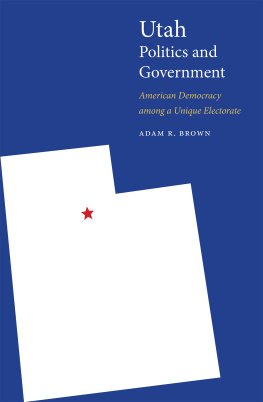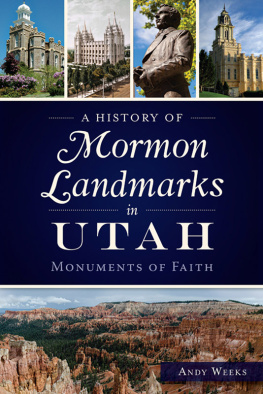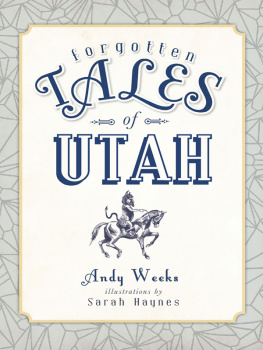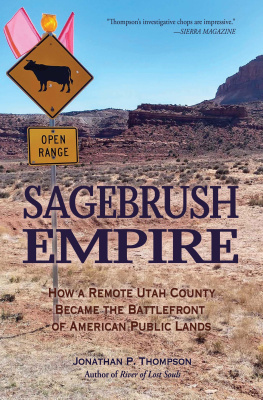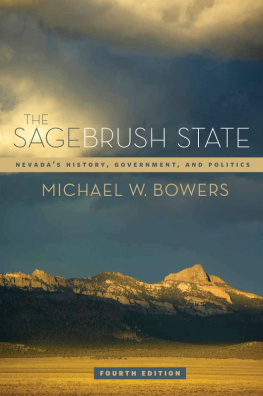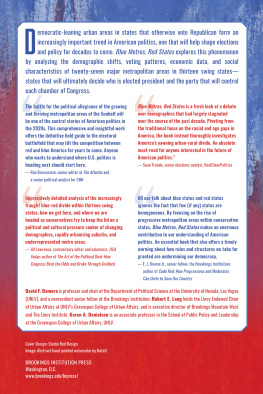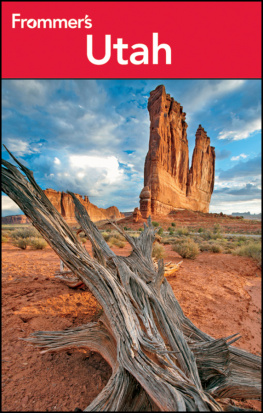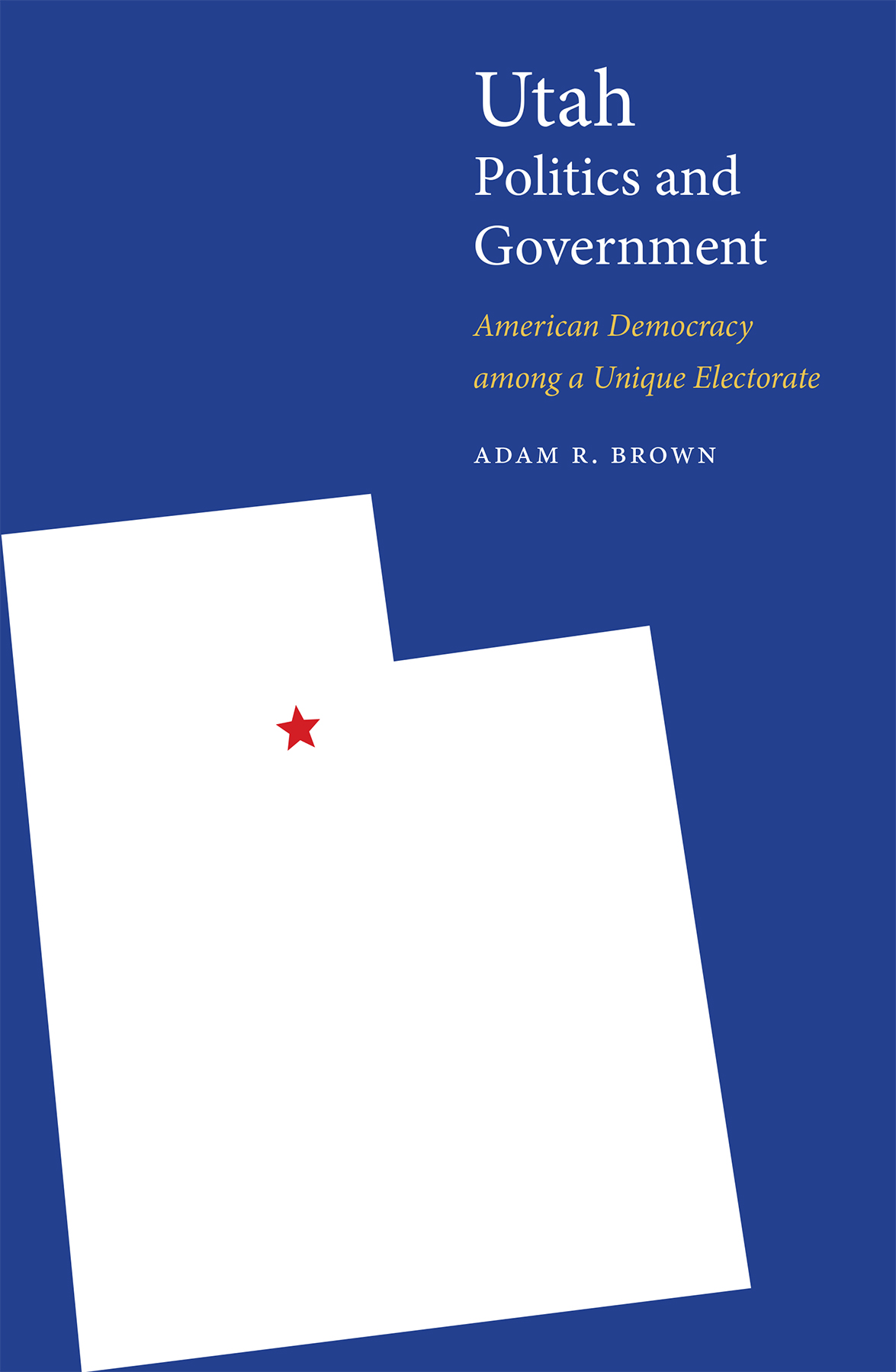
The only book of its kind for Utah. It will serve as an important resource for state employees, interns, and others interested in the topic.
Morgan Lyon Cotti, associate director at the Hinckley Institute of Politics at the University of Utah
A masterful overview of Utah state government. Solidly grounded in the academic state politics literature while also accessible and informative for students and citizens seeking a practical understanding of Utah politics, this book is undoubtedly the go-to resource for understanding government and politics in the Beehive State.
Damon Cann, associate professor of political science at Utah State University
Utah Politics and Government
Politics and Governments of the American States
Founding Editor
Daniel J. Elazar
Published by the University of Nebraska Press in association with the Center for the Study of Federalism at the Robert B. and Helen S. Meyner Center for the Study of State and Local Government, Lafayette College
Utah Politics and Government
American Democracy among a Unique Electorate
Adam R. Brown
University of Nebraska Press | Lincoln and London
2018 by the Board of Regents of the University of Nebraska
Cover designed by University of Nebraska Press.
All rights reserved
Library of Congress Cataloging-in-Publication Data
Names: Brown, Adam R., author.
Title: Utah politics and government: American democracy among a unique electorate / Adam R. Brown.
Description: Lincoln: University of Nebraska Press, 2018. | Series: Politics and governments of the American states | Includes bibliographical references and index.
Identifiers: LCCN 2017053348
ISBN 9781496201805 (paperback: alk. paper)
ISBN 9781496207838 (epub)
ISBN 9781496207845 (mobi)
ISBN 9781496207852 (pdf)
Subjects: LCSH : UtahPolitics and government. | Political cultureUtah. | BISAC : POLITICAL SCIENCE / Government / State & Provincial.
Classification: LCC JK 8416 . B 76 2018 | DDC 320.4792dc23
LC record available at https://lccn.loc.gov/2017053348
The publisher does not have any control over and does not assume any responsibility for author or third-party websites or their content.
Contents
Over the past decade, I have trained and mentored over two hundred undergraduates who have interned in the Utah Capitol. I thank them for sharing their experiences with me. Every year, they reignite the joy of discovery within me as I reenter the political arena vicariously through them. Their insights and ideas have inspired much of the analysis presented in this book, and their curiosity and enthusiasm energize me.
Many people have aided me in collecting and interpreting the data employed here. Luke Bell, Justin Chang, and Matt Beck labored as undergraduate research assistants and compiled much of the data on the Utah Supreme Court and the Utah Constitution. Thad Hall, Chris Karpowitz, and Quin Monson generously shared the raw data from their Utah Elected Officials Survey. I owe a special debt to Chris Karpowitz and Jeremy Pope for organizing a workshop at BYU s Center for the Study of Elections and Democracy and inviting a large group to read and comment on an earlier draft of this book. Feedback received at that workshop has improved this manuscript immensely, though faults obviously remain my own.
I offer special gratitude to my wife Janelle and our sons Hyrum, Alan, and Karl, for enriching my life and motivating me to keep pushing even when life pushes back harder than expected. To you I dedicate all my endeavors.
Making Sense of Utah
Among Americans and foreigners alike, mentioning Utah conjures diverse reactions. World-class skiing. Mormons. The Mighty 5 national parks. Exotic slot canyons. The Great Salt Lake. Schismatic polygamists. Majestic peaks. Charismatic wildlife. Bleak deserts. Cowboy films. The 2002 Winter Olympics. Green Jell-O. Sagebrush rebels. The Mormon Tabernacle Choir. Fry sauce. Noxious winter inversions. Butch Cassidy and the Sundance Kid. The Sundance Film Festival. Odd liquor laws. Pioneers. Utes. Ancient cliff dwellings and petroglyphs. Curious rock formations. Land speed records at the salt flats. The four corners. The Book of Mormonboth the scripture and the Broadway musical. The Salt Lake City Temple. Wilderness. If Utah were one of Americas economic or cultural powerhousesif Utah were a California, a Texas, a New York, or a Floridathese countless reactions would seem natural. Instead it seems that Utahhome to only 1 percent of the U.S. population and even less of its dry landpunches above its weight in American culture.
In politics, however, Utah punches below its weight, if it punches at all. Many reduce it to mere caricature: The reddest of red states, home to perhaps the nations most homogeneous votersreligiously, culturally, and politically. Believing it foregone, presidential campaigns have ignored Utah for decades. Hillary Clintons fleeting attention to Utah during her 2016 presidential campaign was the rare exception that proved the rule; when she dispatched her husband to headline a single fundraiser, then amplified that fundraiser with a single op-ed in a statewide paper, the Despite her efforts Clinton won only 28 percent of Utahs voteright between Barack Obamas share in 2008 (34 percent) and 2012 (25 percent).
Utah votes Republican so reliably that one can hardly blame national campaigns for ignoring it. However, Utahns themselves infer too much from this neglect, acting as though their votes matter as little within Utah as outside it. In a poll I asked Utah voters to rate how much various political institutions affect [their] personal life or financial situation. They answered using a 5-point scale, ranging from 1 (not at all) to 5 (a great deal). Respondents gave higher ratings to the U.S. Congress (4.2) than to the Utah Legislature (4.0); higher ratings to the U.S. president (3.9) than to the Utah governor (3.7); and higher ratings to U.S. courts (3.8) than to Utah courts (3.4). Overall 47 percent of respondents rated the federal governments influence on their lives higher than the state governments. Only 18 percent did the opposite.
These evaluations are misguided. Utahs legislature alone passes twice as many laws per year as the U.S. Congress, and Utahs courts alone hear twice as many cases per year as the nations entire federal court system. Utah is hardly alone, of course: collectively, Americas fifty state legislatures pass roughly one hundred times as many bills per year as Congress, and Americas state court systems consider roughly one hundred times as many cases as the federal courts. State governments are vastly busier than the federal government because they handle most of the policy realms that affect Americans daily lives. State governments run public schools and universities, set punishments for crime, charter cities, regulate corporations, manage pollution, build freeways and reservoirs, maintain parks, generate electricity, fight fires, purify drinking water, certify marriages and adoptions, police the streets, inspect restaurants, issue professional licenses, and zone neighborhoods. State policy has more impact on Utah lives and wallets than federal policy.
Utahns nevertheless remain embarrassingly ignorant of their state government. Respondents were also somewhat more likely to know that U.S. senators serve six-year terms (56 percent) than to know that Utah senators serve four-year terms (49 percent). Overall the average respondent answered 69 percent of the national questions correctly, compared to 44 percent of the Utah questions, a disappointing 25-point gap.

